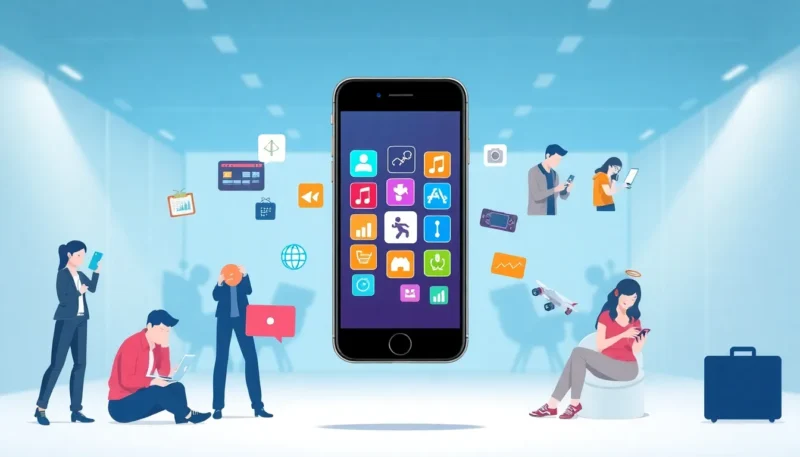
In today’s digital landscape, mobile apps are not just a nice-to-have – they’re a necessity. With the world quite literally in the palms of their users’ hands, businesses recognize that a well-crafted mobile app can boost engagement, enhance visibility, and eventually drive sales. So, if you’ve ever wondered about mobile app development services or are ready to jump into the process, this comprehensive guide will walk you through everything you need to know. Get ready, because this might just be the start of your mobile revolution.
Jasa Pembuatan Mobile Apps

Mobile app development services encompass a range of offerings that help transform ideas into functioning applications. These services can vary widely, but they typically include everything from ideation and design to development, testing, and maintenance.
When partnering with a mobile app development company, it’s essential to understand exactly what services are included. This may cover UI/UX design, backend development, quality assurance, and post-launch support. Each element is crucial, ensuring that the final product not only meets user expectations but also functions seamlessly across various devices.
But here’s the kicker – engaging with a professional service can save significant time and effort compared to attempting to build an app in-house. Companies can leverage the expertise of skilled developers who know the ins and outs of various platforms and best practices, allowing them to focus on core business activities instead.
Types of Mobile Apps Offered
The world of mobile apps is diverse, and accordingly, different types exist to suit various needs. Here are some of the most common types you might encounter:
Native Apps
Native apps are built specifically for one platform (iOS or Android), allowing them to use device features like the camera or GPS optimally. This type often provides top-notch performance and a seamless user experience.
Hybrid Apps
A hybrid app combines elements from both native and web apps. These are usually easier and faster to build and can run on various devices. Businesses often choose them for cross-platform compatibility.
Web Apps
Web apps are essentially websites that are designed to look and feel like mobile applications. They don’t require installation and are accessed through a web browser, making them easier and less costly to develop.
Each type carries its own advantages, and the choice largely depends on the business goals, budget, and the specific audience for the app.
The Mobile App Development Process
Developing a mobile app is not an overnight task: it follows a detailed process that ensures quality and functionality. Here’s a quick overview:
1. Planning
This phase involves defining the app’s purpose, target audience, and objectives. Research is critical. Here, developers gather insights that shape the app’s direction.
2. Design
User interface (UI) and user experience (UX) design come into play here. A good design ensures users find the app visually appealing and easy to use. Sketches and prototypes are often created during this stage.
3. Development
The coding phase is where the actual magic happens. Developers will create the app’s features and functionalities. Depending on whether the app is native, hybrid, or web-based, the coding languages will differ.
4. Testing
Quality assurance is paramount. Various testing methods, such as unit testing and user acceptance testing, ensure the app works flawlessly across all devices and scenarios.
5. Launch
After rigorous testing, it’s time for the grand launch. The app is submitted to the relevant app stores, and marketing efforts begin to create buzz.
6. Maintenance
Post-launch, developers offer ongoing support, updating the app to ensure it remains functional and relevant as technological advances and user needs evolve.
Key Benefits of Hiring Mobile App Development Services
Engaging a professional mobile app development service offers numerous advantages:
- Expertise: Developers have specialized skills and experience in building apps, resulting in better quality products.
- Time Efficiency: Professionals can streamline the development process, allowing for a faster time-to-market.
- Customization: Tailored solutions ensure that the app aligns precisely with business objectives and user needs.
- Post-Launch Support: Many services offer maintenance packages, guaranteeing the app remains up-to-date.
Choosing the Right Mobile App Development Partner
Selecting a mobile app development partner can feel daunting with so many options available. Here are some tips to help narrow the field:
- Portfolio Review: Check for past projects and successes. An impressive portfolio indicates a company’s capability.
- Client Testimonials: Feedback from previous clients can provide insight into reliability and quality.
- Technical Expertise: Ensure the development team is proficient in the required technology stacks.
- Communication: A good developer values clear communication, ensuring you stay in the loop throughout the process.
Cost Considerations in Mobile App Development
Costs for mobile app development can vary significantly based on multiple factors:
- Complexity of the App: More features generally mean a higher price tag.
- Platform Choice: Developing for both iOS and Android can increase costs since it requires more resources.
- Developer Location: Rates may vary depending on geographical location. Hiring local developers might be pricier compared to outsourcing to countries with lower labor costs.
- Maintenance and Updates: Remember to factor in post-launch maintenance, which can add to the overall investment.
When budgeting, clarity on these aspects can prevent unpleasant surprises down the line.
Future Trends in Mobile App Development
As technology evolves, so too does mobile app development. Here are some trends to watch:
- AI Integration: Artificial intelligence is becoming vital in creating smarter apps, enhancing user experience through personalized recommendations.
- 5G Technology: With faster speeds, apps will be able to offer more complex functionalities and deliver richer content.
- IoT Connectivity: As the Internet of Things expands, apps that interact with smart devices will likely gain prominence.
- No-Code Development: This emerging trend allows non-technical users to create apps, broadening access to app development.












